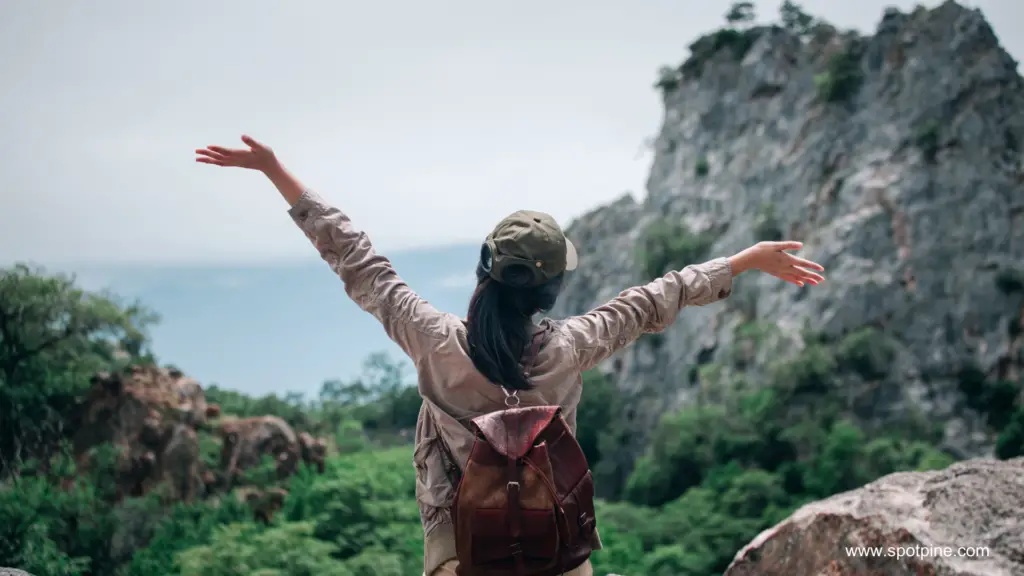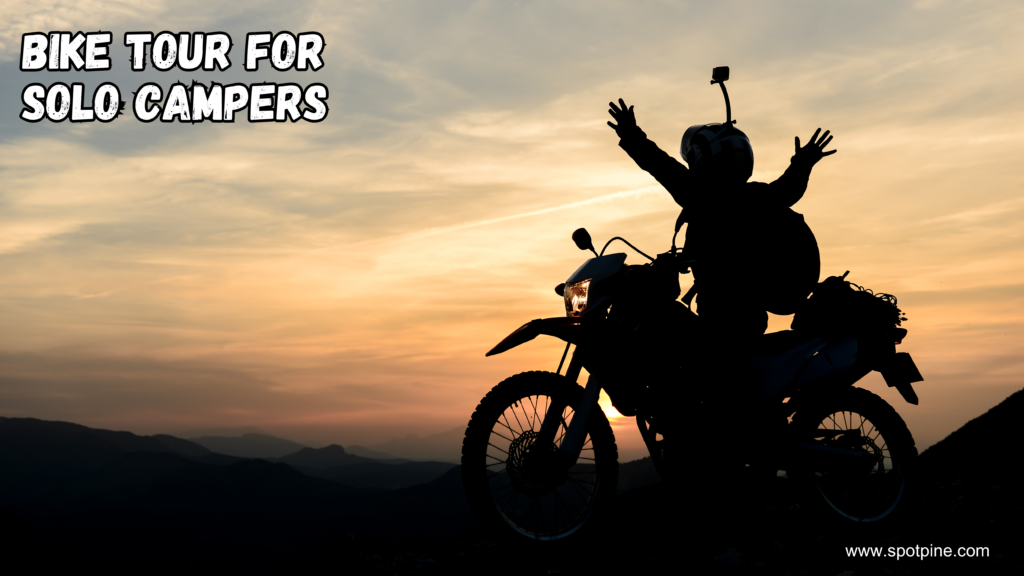To plan a solo camping trip on a budget, research affordable camping gear options and choose a nearby destination with free or low-cost campsites. Start by setting a budget, making a checklist of essential items, and opting for public lands or national forests for cost-effective camping experiences.
Consider borrowing or renting gear, packing light, and preparing your own meals to save money on your outdoor adventure. By planning ahead and being resourceful, you can enjoy a budget-friendly solo camping trip filled with nature and solitude.
Choosing The Right Destination
Planning a solo camping trip on a budget? Research potential destinations known for their affordability and safety. Consider factors such as accessibility, climate, and available facilities. Look for camping areas that offer discounts or free entry for solo adventurers. Check online reviews and travel forums for firsthand experiences and recommendations from fellow budget travelers.
Deciding where to go for your solo camping adventure is crucial.
Researching Budget-friendly Camping Spots
Finding a camping spot that fits your budget is essential.
- Look for campgrounds with lower fees or even free camping options.
- Check for off-peak season rates to save money.
- Consider national forests or BLM land for cost-effective camping.
Considering Nearby Amenities For Convenience
Having amenities nearby can make your camping trip more convenient and enjoyable.
- Look for campsites with clean water sources.
- Choose locations with bathrooms or restroom facilities.
- Check for nearby stores in case you need supplies during your trip.
Packing Smartly
When planning a solo camping trip on a budget, packing smartly becomes crucial. By focusing on essential gear and employing lightweight and cost-effective packing tips, you can ensure an enjoyable and budget-friendly camping experience. In this section, we will discuss the essential gear for solo camping and provide you with tips for packing efficiently.
Essential Gear For Solo Camping
Before embarking on your solo camping adventure, it’s essential to equip yourself with the right gear. Here are some items you absolutely need:
| Item | Description |
| Tent | A lightweight and compact tent that provides adequate shelter from the elements. |
| Sleeping bag | A warm and lightweight sleeping bag that suits the climate you’ll be camping in. |
| Cooking equipment | A portable stove, cookware, and utensils for preparing your meals. |
| Navigation tools | A compass, map, and GPS device to help you navigate your surroundings. |
| First aid kit | A compact first aid kit containing essential items for any emergencies. |
| Headlamp or flashlight | A reliable light source for navigating in the dark. |
| Multi-tool | A versatile tool that can come in handy for various tasks. |
Tips For Lightweight And Cost-effective Packing
When it comes to packing for a solo camping trip on a budget, it’s important to be mindful of weight and cost. Here are some tips to help you pack smartly:
- Choose lightweight and compact versions of your camping gear to minimize the overall weight of your backpack.
- Opt for versatile items that serve multiple purposes, such as a bandana that can be used as a towel, a hat, or a makeshift bag.
- Roll your clothes instead of folding them to save space and prevent wrinkles.
- Invest in a durable and reusable water bottle to reduce the need for purchasing disposable plastic bottles.
- Consider borrowing or renting specific gear that you may not frequently use instead of buying it.
- Plan your meals in advance and pack lightweight, non-perishable food items that are easy to prepare.
- Organize your gear in separate waterproof bags or stuff sacks to keep everything organized and protected from rain or water splashes.
- Research camping areas that offer amenities such as potable water and restroom facilities, reducing the need to carry excessive supplies.
- Review your packing list several times to ensure you only bring essential items and eliminate unnecessary weight.
By following these tips and focusing on essential gear, you’ll be well-prepared for your solo camping trip while keeping your budget in mind. Remember, packing smartly can make a significant difference in the quality and comfort of your camping experience.

Meal Planning
Camping on a budget doesn’t mean sacrificing tasty meals. Proper meal planning ensures you can enjoy delicious and nutritious food even when solo camping. Here are some essential tips for meal planning while on a budget.
Budget-friendly Meal Ideas For Camping
Opt for simple meals like canned soups, pasta dishes, and sandwiches to keep costs low. Pack non-perishable items like instant noodles, canned beans, and trail mix for easy and affordable meals. Consider preparing meals in advance to save time and money.
Food Storage Solutions To Avoid Waste
Invest in reusable containers to store leftover food and prevent waste. Use zip-lock bags for portion control and to keep food fresh. Store perishable items in a cooler with ice packs to maintain freshness.
Safety Precautions
When planning a solo camping trip on a budget, prioritizing safety precautions is crucial.
Emergency Preparedness Tips:
- Learn basic first aid and how to identify common plants for medicinal purposes.
- Pack a well-stocked first aid kit including bandages, antiseptic wipes, and pain relievers.
Navigating The Wilderness Alone:
- Plan your route in advance and inform a trusted contact of your itinerary.
- Carry a map, compass, or GPS device and know how to use them effectively.
Remember, being prepared and vigilant are key to staying safe while camping solo.
Transportation Options
When planning a solo camping trip on a budget, selecting the right transportation options is crucial. By choosing affordable methods of transportation and effectively planning for parking and logistics, you can ensure a cost-effective and efficient travel experience.
Choosing Affordable Transportation Methods
Consider utilizing public transportation such as buses or trains, as they often offer budget-friendly fares for solo travelers. Additionally, carpooling with friends or using ride-sharing services like Uber or Lyft can help cut costs on transportation.
Planning For Parking And Logistics
- Research parking options at your camping destination and choose cost-effective or free parking areas whenever possible.
- Pack light and compact to minimize the need for excess space in your vehicle, thus reducing potential extra costs or logistical challenges.
Setting Up Camp
Setting up camp is the crucial part of a solo camping trip. Ensuring a smooth and efficient camp setup can make your experience more enjoyable and stress-free. From choosing the right campsite to setting up your tent, here are some essential tips to consider for a successful solo camping adventure.
Tips For Efficient Tent Setup
- Before heading out, practice setting up your tent at home to familiarize yourself with the process.
- Choose a level ground to pitch your tent, clearing any rocks or debris to avoid discomfort during your sleep.
- Secure your tent with strong stakes to withstand potential wind or rain.
- Utilize the rainfly for extra weather protection, ensuring it is properly attached and taut.
- Organize the interior of your tent by using compartmentalized storage solutions for a comfortable and clutter-free space.
Choosing The Right Campsite
When selecting a campsite, consider the following factors:
- Safety: Look for a location that is away from hazardous areas such as steep cliffs or areas prone to flooding.
- Proximity to water: Ensure your campsite is close enough to a water source for convenience but not too close to avoid potential flooding.
- Shade: Seek a spot with natural shade to protect you from the sun’s heat during the day.
- Scenic views: Opt for a campsite that offers beautiful views of the surrounding landscape to enhance your overall camping experience.
Entertainment And Activities
When planning a solo camping trip on a budget, finding low-cost entertainment and activities is essential. After all, you want to enjoy your time in nature without breaking the bank. Fortunately, there are plenty of ways to stay entertained during your camping adventure without spending a fortune.
Low-cost Adventure Ideas
For those seeking an adventurous experience without emptying their wallets, there are several budget-friendly options to consider. Here are some exciting ideas:
- Explore local hiking trails: Lace up your hiking boots and hit the trails. With countless hiking destinations, you can discover breathtaking views, wildlife, and peaceful surroundings – all for free!
- Go fishing: Cast your line into a nearby river or lake. Fishing is not only a great way to relax and unwind, but it can also provide a delicious meal if you manage to catch something.
- Try geocaching: Join the global treasure hunt known as geocaching. All you need is a GPS device or a smartphone to navigate and find hidden caches in the great outdoors.
Staying Entertained Without Breaking The Bank
Just because you’re on a budget doesn’t mean you can’t have fun while camping. Here are some inexpensive ways to keep yourself entertained:
- Start a campfire: Gather some firewood and enjoy the warmth and coziness of a campfire. It’s a great opportunity to roast marshmallows, share stories, and gaze at the stars.
- Bring along a deck of cards or board games: Don’t underestimate the power of traditional games. Unplug from technology and challenge yourself or fellow campers to a friendly game of cards or board games.
- Read a book or listen to podcasts: Embrace the tranquility of nature by diving into a captivating book or listening to informative podcasts. It’s the perfect way to relax and expand your knowledge.
- Engage in stargazing: Look up at the night sky and marvel at the beauty of the stars. With little to no light pollution in the wilderness, you can enjoy a breathtaking view of the cosmos.
- Take up photography: Capture the beauty of your surroundings through the lens of your camera or smartphone. Photography can be a rewarding and fulfilling hobby that allows you to unleash your creativity.
Remember, camping on a budget doesn’t mean compromising on fun. With these low-cost adventure ideas and entertaining activities, you can have an unforgettable solo camping trip without breaking the bank. Get ready to immerse yourself in nature, create incredible memories, and enjoy every moment of your budget-friendly expedition.
Reflecting On The Experience
Planning a solo camping trip on a budget can be a rewarding experience. By carefully considering your itinerary and expenses, you can enjoy the beauty of nature while saving money.
Journaling For Self-reflection
Reflecting on your solo camping trip is a crucial step in making the most out of your experience. One effective way to do this is through journaling. Keeping a journal allows you to document your thoughts, emotions, and observations during your trip, enabling you to gain deeper insights into yourself and your surroundings.
Journaling allows you to capture the little details that may otherwise be forgotten over time. Whether it’s the sound of birds chirping at dawn, the feeling of the cool breeze against your skin, or the taste of the campfire-cooked meal, jotting down these sensory experiences can help you relive the magic of your camping adventure.
Furthermore, writing down your thoughts allows you to process and reflect on your experiences. You can explore how solitude and nature impacted your state of mind, how you overcame challenges, and what you discovered about yourself in the process.
Make it a habit to set aside a few minutes each day during your trip to record your thoughts in your journal. This dedicated time for self-reflection can be a calming and therapeutic activity, helping you gain a clearer understanding of yourself and the world around you.
Lessons Learned For Future Budget Camping Trips
As you reflect on your solo camping trip, take the time to identify the valuable lessons you’ve learned. These lessons will serve as a guide for your future budget camping adventures, allowing you to make each trip even more enjoyable and cost-effective.
To help you organize and remember these lessons, create a checklist or a spreadsheet where you can record the insights you’ve gained. This will ensure that you have a handy reference for your upcoming trips.
Some key lessons that you may want to include in your checklist are:
- Optimize your packing: Keep track of the items you brought but didn’t use, as well as the things you wish you had brought. This will help you pack more efficiently for future trips.
- Explore cost-saving options: Take note of the affordable camping gear stores, discount codes, or camping hacks you discovered during your journey. These insights will help you save money on gear and supplies.
- Discover budget-friendly campsites: Document the campsites you stayed at and their costs. If you find any hidden gems or budget-friendly options, make sure to note them down for future reference.
- Learn from your menu: Keep track of your prepared meals and their costs. Identify which dishes were budget-friendly and delicious, so you can recreate them on your next camping trip.
By creating a comprehensive lessons-learned checklist, you can continuously improve your budget camping skills and enhance the overall experience of your solo adventures in the great outdoors.

Planning a solo camping trip on a budget doesn’t have to be daunting. With careful preparation, research, and resourcefulness, you can have a memorable outdoor adventure without breaking the bank. By determining your priorities, making a detailed itinerary, and packing smartly, you’ll be able to save money while still enjoying nature’s beauty.
Remember, solo camping can provide a unique and rewarding experience that allows you to connect with yourself and the world around you. So start planning, and get ready for an unforgettable journey!




Pingback: Solo Camping in USA: A Guide for International Students